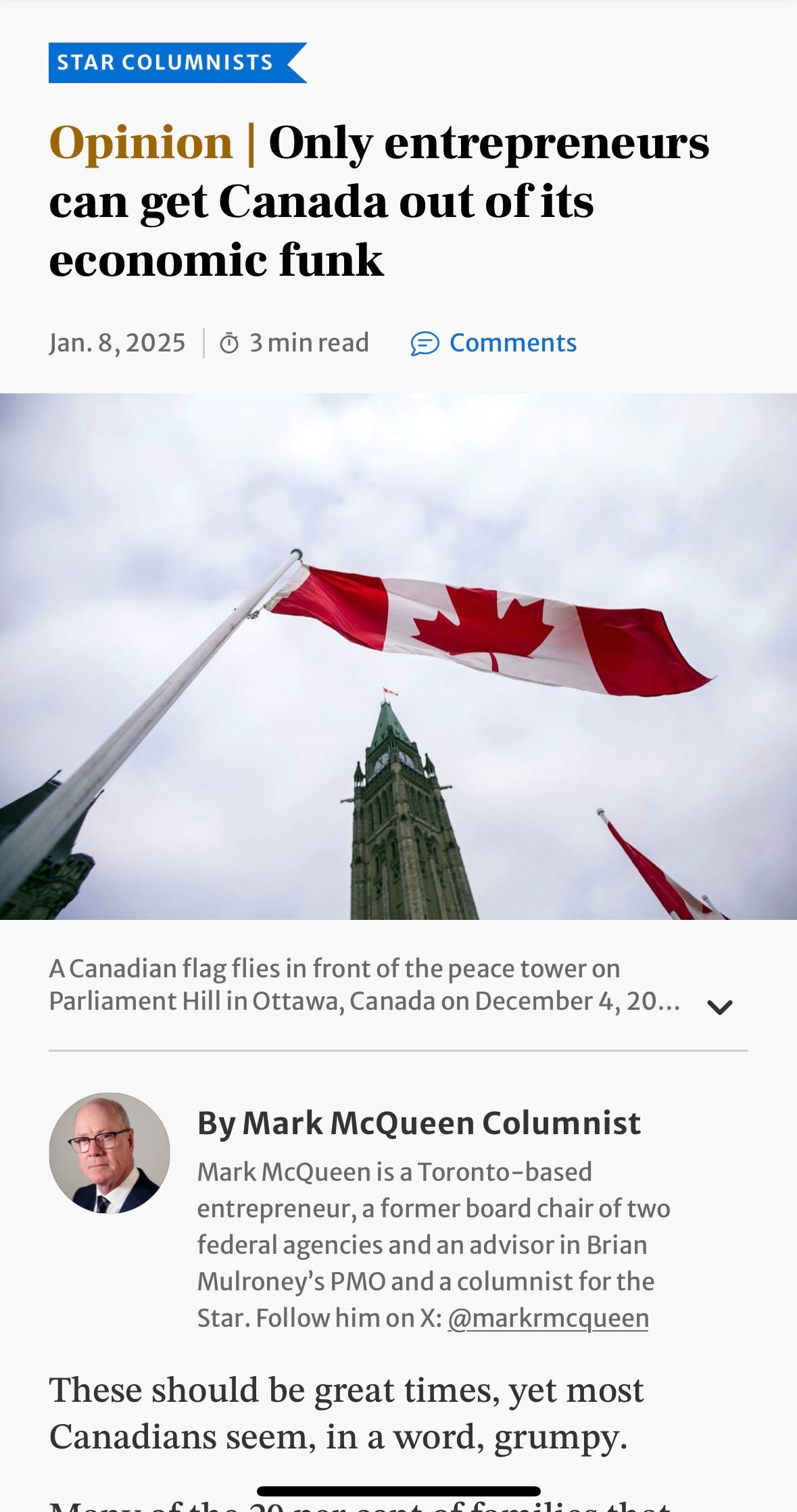Many trees will have fallen over the last couple of days in support of newspaper columnists attempting to bring some unique context to Prime Minister Justin Trudeau’s resignation. BNN Bloomberg had me on for some play-by-play before and after Mr. Trudeau’s speech, and there’s little to add. ICYMI, here’s the third and final BNN segment.
This week’s Toronto Star column focuses on the tough road ahead, and there’s plenty of blame to go around. The Trudeau government, along with its NDP backers, wear much of Canada’s increasingly-troubled economic situation, but Ottawa’s bureaucrats — and Canada’s culture of risk avoidance — have all had a hand. 650 words isn’t much space to outline both the evidence of a problem AND provide my perspective on the primary solution, but I’ve given it a shot. If you want to see how it ends, buy a print copy, use your Apple News, or subscribe to The Star online via my special discount code: www.thestar.com/informed:
These should be great times, yet most Canadians seem, in a word, grumpy.
Many of the 20 per cent of families that pay almost two-thirds of all income tax collected worry about how their taxes are being spent. For the families and young people who live paycheque-to-paycheque, inflation and government ineptitude have undercut much of the benefit of the expensive new programs that were designed to make their lives substantially easier.
Troubled by Canada’s trajectory, many parents with means are rationalizing the $500,000 cost of a U.S. university education for their child. I’ve heard of several billionaires who have, rather than waiting for an election, already voted with their feet and moved abroad, taking their investment and philanthropic capital with them.
At the same time, our political leaders crow that from 2000 to 2023 Canada’s average GDP growth was second-highest in the G7, and that the International Monetary Fund projects Canada will lead the G7 in 2025.
Rosy economic headlines like these should have presented the Liberal government with a viable shot at a fourth mandate. Except for the reality that, as highlighted by the Fraser Institute: “there’s a serious problem with these measures — they fail to account for population growth rates in each country and therefore don’t measure whether or not individuals are actually better off.”
That’s why most Canadians feel like they’re treading water. Despite hundreds of billions of dollars of “strategic investments,” our economy has expanded almost exclusively due to immigration-fuelled population growth.
This has come at a cost, and most of us have suffered from this lazy approach to growing an economy: increased taxes, longer hospital wait times, congested roads and public transit, and higher youth unemployment.
Canada kept pace with the U.S. economy from 1961 to 2001, and then the wheels came off. As a tech company financier when the 2000-era dot-com bubble famously burst, I recall how quickly Canadian investors pulled back from financing our information technology and life science startups.
American investors took the NASDAQ market swoon in stride and 2004 saw the initial public offerings of Google, Salesforce and DreamWorks Animation, among others. More than 50 biotechs also hit the U.S. public markets that year. Most Canadian investors hid when the New Economy came knocking, favouring real estate, mining or oil and gas firms.
This has been our reality for the last 20 years, with serious repercussions for our standard of living.
To read the rest of the piece, hit the link.
MRM
(this post is an Opinion Piece)





I agree, however I think we ignore the wave that about to crash on Canada’s shores at our peril. Economic union with the U.S. is a certainty as IMHO Cda isn’t economically or politically capable of going toe to toe with President Trump.Also it will quickly address the malaise afflicting Canada’s business community and regulatory environment and quickly return Canada back to the world stage on the credibility front geopolitically and economically. If we fight it, we risk Cdn confederation. The U.S. doesn’t care about Ontario or Quebec much so the Family Compact can only hurt us until we start loosing Provinces not willing to toe the central Canada line My $0.02 CDN for what it’s worth. Comments welcome. Thank you.